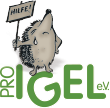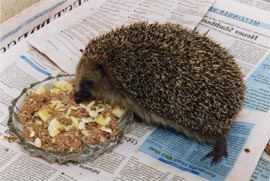 Hedgehogs are insectivores, but in captivity you should not feed them snails, earthworms, etc. from the wild, because these are carriers of internal parasites. The diet of a hedgehog carer must be based on the composition of the natural food. It must be rich in fat and protein.
Hedgehogs are insectivores, but in captivity you should not feed them snails, earthworms, etc. from the wild, because these are carriers of internal parasites. The diet of a hedgehog carer must be based on the composition of the natural food. It must be rich in fat and protein.
Diet
Hedgehogs must never be fed on a one-sided diet! Suitable for a varied diet are:
- Moist cat or dog food (high quality, at least 60% meat)
- Eggs (hard-boiled or scrambled, unseasoned)
- Poultry meat (chicken or turkey, cooked)
- Minced meat (briefly roasted, cooked through)
- bred feed insects (crickets, grasshoppers, etc., fresh or frozen)
- Also suitable: e.g. mutton or game meat, offal such as liver and heart, saltwater and freshwater fish, sea animals and day-old chicks
It is best to prepare mixed food: 50% moist cat food and 50% egg or meat or fish, etc. For frying we recommend vegetable oil such as sunflower or corn oil.
Additional vitamin and/or mineral supplements are only rarely used and are recommended only according to veterinary prescription. Too much – especially fat-soluble vitamins – can do more harm than good!
Do not feed hot or directly from the refrigerator! Do not give the hedgehog any leftover food, nothing sweet or spicy. Fruit and vegetables, cheese, nuts, quark and yoghurt do not belong on the hedgehog’s menu. For “brushing teeth” (hedgehog teeth tend to tartar build-up) give some cooked chicken giblets (wings, necks, back) with the bones or a beef soup bone at least once a week.
Exclusive feeding with moist cat food is inadvisable. Commercially available hedgehog food (moist and dry food) is not suitable.
More details on the correct diet for hedgehogs can be found in Igel-Bulletin 50 and in the leaflet “Feeding hedgehogs in need of help“.
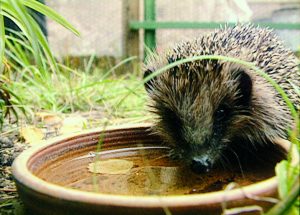
Even the best hedgehog food recipe cannot be a complete substitute for natural hedgehog food. Substitute food saturates the hedgehog and makes him grow. However, with “artificial food” we also influence the hedgehog’s physiological digestive and metabolic processes and change the hedgehog-specific intestinal flora – one of the reasons why the stay in human care must always be kept as short as possible.
Recipes for feed mixtures (after M. Neumeier / C. Schiller)
Attention: All recipe ingredients (except cat food) must be cooked, i.e. boiled or fried!
| Recipes (100 g feed mixture1) | Rp2 % | Rf2 % | KH2 % | H2O2 % | kcal |
|---|---|---|---|---|---|
| 50 g cat food + 10 g chicken liver + 40 g chicken meat with skin | 18,4 | 7,5 | 1,6 | 69,0 | 140 |
| 50 g cat food + 50 g chicken hearts | 14,1 | 5,2 | 1,4 | 75,6 | 102 |
| 50 g cat food + 50 g day-old chicks | 12,5 | 5,0 | 1,1 | 70,0 | 92 |
| 50 g cat food + 50 g chicken wings | 18,4 | 8,5 | 1,0 | 68,5 | 185 |
| 30 g cat food + 70 g scrambled eggs | 14,2 | 11,4 | 1,2 | 70,7 | 154 |
| 50 g cat food + 20 g beef liver + 30 g beef (medium fat) | 17,3 | 7,3 | 2,3 | 70,9 | 137 |
| 50 g cat food + 25 g beef heart + 25 g beef (medium fat) | 16,7 | 5,0 | 1,2 | 73,6 | 111 |
| 50 g cat food + 50 g mutton (fat) | 16,2 | 14,8 | 1,0 | 64,6 | 194 |
| 50 g cat food + 25 g scrambled eggs + 25 g minced beef | 15,9 | 9,08 | 1,4 | 70,1 | 142 |
| 50 g cat food + 50 g hake | 15,0 | 3,3 | 1,0 | 76,3 | 94 |
| 50 g cat food + 50 g Pacific salmon | 15,5 | 3,2 | 1,0 | 76,7 | 89 |
| 50 g cat food + 50 g squid | 14,2 | 3,1 | 2,2 | 76,7 | 88 |
| 50 g cat food + 50 g prawns (shrimps) | 14,4 | 3,3 | 1,4 | 77,2 | 87 |
| 50 g cat food + 25 g dried silkworms soaked in 25 g water | 18,0 | 9,5 | 1,9 | 65,8 | 165 |
1 The difference to 100 % from the sum of the nutrient data results from the mean values of the nutrient contents and the crude fibre and crude ash contents not specified here.
2 Rp = crude protein; Rf = crude fat; KH = carbohydrates; H2O = water
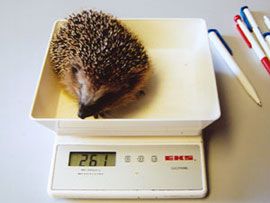
In the beginning the hedgehog is weighed daily, later only weekly. You place him on his back in the weighing pan and blow on him a little to keep him calm.
If an emaciated animal has to catch up, it can gain 15 to 20 g a day, later it should be about 10 to 15 g a day. Well-fed adult hedgehogs, which have been taken in e.g. because of an injury, need only be kept on their weight. Undernourished or severely emaciated animals should be given very small portions every two hours at the beginning to avoid straining their circulation too much.
As a rule, they are fed only once a day, in the evening. However, if an obviously hungry hedgehog runs around the enclosure restlessly during the day, you can of course offer him food. Food leftovers must be thrown away and the bowls must be rinsed hot daily (or after each meal).
Very sick and weak hedgehogs which do not take up any food independently should be force-fed. To do this, place the hedgehog with his back in your hand (if necessary, place him in a towel) and feed him in a slightly seated position with a disposable syringe (1, 2 or 5 ml) which is inserted into his mouth at the side. Mix the food according to the instructions and administer it very slowly and drop by drop to prevent the hedgehog from choking. Depending on the size of the animal, portions of 10 to 30 ml are given four to five times a day. In addition, normal food is offered to the hedgehog in his enclosure so that he has the opportunity to eat it himself as soon as possible.
Suitable for force feeding are e.g. the preparations Hill’s Prescription Diet “CANINE a/d FELINE” or “Recovery Royal canine veterinary diet” which can be obtained from the veterinarian or in well-stocked pet shops. If the contents of the can are too solid for syringe feeding, dilute the puree with some fennel or chamomile tea. For a transitional period (if possible not longer than one day) you can also feed a low-lactose, ready-to-use cat milk. Preparations for rearing hoglets, cats or dogs are not suitable for force feeding!
A hedgehog which requires force-feeding must of course be presented to a vet or hedgehog rescue centre!
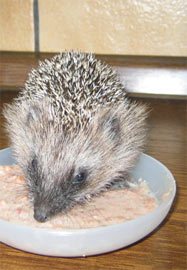
- Fruit: apples, pears, grapes, plums, avocados etc.
- Vegetables: salad, carrots, potatoes etc.
- Milk and dairy products: cheese, quark, yoghurt etc.
- cereal products: bread, pastries, rice, noodles, etc.
- Nuts, raisins
- pap for human children
- food leftovers, kitchen waste
Hedgehogs feeding on fruit is an old fairy tale. If you see a hedgehog on a plum in the garden, only the worms and insects crawling on it will attract him. Because of their short gastrointestinal tract hedgehogs cannot digest plant food and therefore cannot use it. Even if a hedgehog nibbles hungrily on an apple, and it may taste sweet (like most mammals), this does not nourish him. Sooner or later a vegetarian hedgehog will starve to death!
A one-sided diet causing a lack of certain minerals or trace elements can lead to severe neuromuscular diseases in the hedgehog which are often accompanied by paralysis and, if left untreated, are usually fatal.
It is not uncommon for hedgehogs in captivity to be overfed and become fat. Excessive weight gain in young hedgehogs often leads to damage to bones and joints. Thus, the body weights of juveniles should not exceed 600 g (females) and 650 g (males) at the beginning of their first hibernation.

